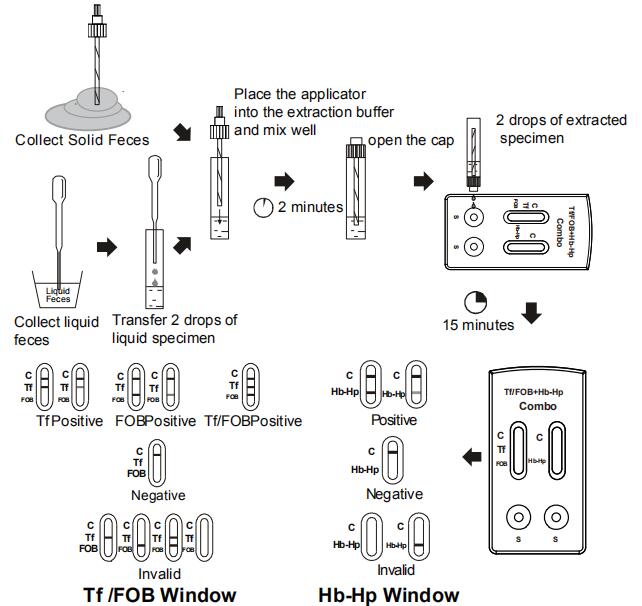Penerangan
【SUMMARY】
Colorectal cancer is cancer that occurs in the colon or rectum, and affects both men and women of all racial and ethnic groups, and is most often found in people aged 50 years or older. For men, colorectal cancer is the third most common cancer after prostate and lung cancers. For women, colorectal cancer is the third most common cancer after breast and lung cancers. Fecal occult blood should be an important indicator in the diagnostic evaluation of patients with suspected gastrointestinal bleeding of any etiology, not just as an indication of colorectal cancer. The presence of human hemoglobin in feces is inadequate as a screening test for stomach cancer (upper gastrointestinal disorders), because of human hemoglobin derived from the upper digestive tract is broken down in the intestinal tract (the antigenicity is lost). Detection of fecal transferrin, which is more stable in stool than hemoglobin, provides an alternative way of diagnosing the disease in the upper digestive tract. Blood in the stool may be the only symptom of cancer, but not all blood in the stool is caused by cancer. Other conditions that can cause blood in the stool include: Haemorrhoids, Anal fissures, Colon polyps, Peptic ulcers, Ulcerative colitis. Gastroesophageal reflux disease (GERD). Crohn's disease, use of non-steroidal anti-inflammatory drugs (NSAIDs). The Hemoglobin-Haptoglobin Complex Rapid Test immunological test based on the detection of the Hemoglobin-Haptoglobin (Hb-Hp) complex. Meguro, who also found excellent sensitivity and fecal extracts the Hb-Hp complex was more stable than unbound hemoglobin. Thus, in patients with proximal colorectal bleeding, the Hb-Hp complex could probably be detectable in stool, even after a longer passage.
【DIRECTIONS FOR USE】
Allow the test, specimen, buffer and/or controls to reach room temperature (15-30°C) prior to testing.
1. To collect fecal specimens:
Collect sufficient quantity of feces (1-2ml or 1-2g) in a clean, dry specimen collection container to obtain maximum antigens (if present). Best results will be obtained if the assay is performed within 6 hours after collection. Specimen collected may be stored for 3 days at 2-8℃ if not tested within 6 hours. For long term storage, specimens should be kept below - 20℃.
2. To process fecal specimens:
• For Solid Specimens:
Unscrew the cap of the specimen collection tube,then randomly stab the specimen collection applicator into the fecal specimen in at least 3 different sites to collect approximately 50 mg of feces (equivalent to 1/4 of a pea). Do not scoop the fecal specimen.
• For Liquid Specimens:
Hold the dropper vertically, aspirate fecal specimens, and then transfer 2 drops (approximately 80μL) into the specimen collection tube containing the extraction buffer.
3. Tighten the cap onto the specimen collection tube, then shake the specimen collection tube vigorously to mix the specimen and the extraction buffer. Leave the tube alone for 2 minutes.
4. Bring the pouch to room temperature before opening it. Remove the test cassette from the foil pouch and use it within one hour. Best results will be obtained if the test is performed immediately after opening the foil pouch.
5. Hold the specimen collection tube upright and open the cap onto the specimen collection tube. Invert the specimen collection tube and transfer 3 full drops of the extracted specimen (approximately 120μL) to the specimen well (S) of the test cassette, then start the timer. Avoid trapping air bubbles in the specimen well (S). See illustration below.
6. Read results at 5 minutes after dispensing the specimen. Do not read results after 10 minutes.
Note: If the specimen does not migrate (presence of particles), centrifuge the extracted specimens contained in the extraction buffer vial. Collect 120μL of supernatant, dispense into the specimen well (S) of a new test cassette and start afresh following the instructions mentioned above.

|
Cat. No.
|
Product Description
|
Specimen
|
Format
|
Kit Size
|
Cut-Off
|
Status
|
|
TTFH-635
|
Transferrin/FOB and Hb-Hp Combo Rapid Test Cassette
|
Feces
|
Cassette
|
25 T
|
See Insert
|
CE
|
Lebih maklumat tentang Setia Scientific Solution

 Malaysia
Malaysia